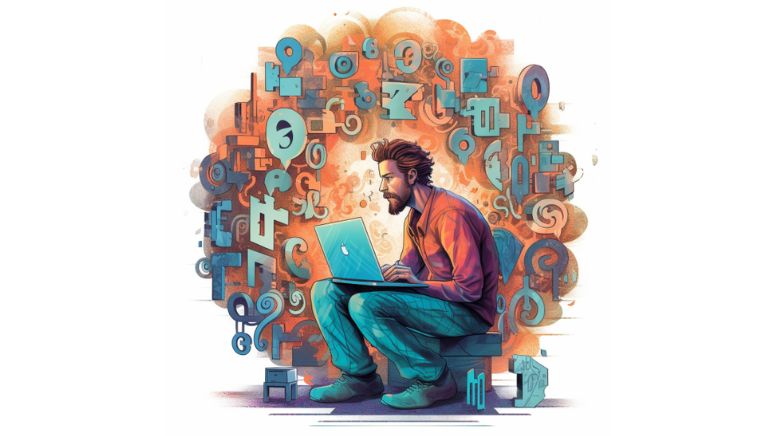Career
AI at work: Get answers to your questions about what you’re allowed to do

The image was created with artificial intelligence in the program Midjourney based on this prompt: A man sitting in front of a computer surrounded by question marks and paragraph symbols
A survey of IDA members in September 2025 shows that more than 70 per cent of members use AI in their work – and 47 per cent of them use AI on a daily basis.
64 per cent have employers who encourage their employees to use AI to perform their tasks. However, this encouragement is not accompanied by guidelines, as 35 per cent of members either work in a place where there are no guidelines for the use of AI or do not know whether their workplace has formulated any guidelines.
If you have unanswered questions about the use of AI at work, you can find answers to some of them here from IDA's legal advisors.
Do I need permission from my manager to use ChatGPT in my work?
The short answer is: yes. Before you start using ChatGPT or other AI tools in your work, ask your manager for permission to use it for the tasks you intend to.
It is your manager or the company's management that decides how tasks are to be solved and with which tools. In this connection, it is also very important that you examine and follow the company's overall guidelines regarding the use of AI tools such as ChatGPT.
What can I do to get clear guidelines for using ChatGPT at my work?
Gradually, clear guidelines for the use of AI tools have been set in many companies. But if this is not the case at your workplace, you can contact the company's DPO (Data Protection Officer) or HR/the legal department to ensure that you stay in line with the company's guidelines and wishes.
What can I share with ChatGPT and what can't I share?
If you share text, code or other data with ChatGPT, it is important that you know what is permitted - both generally in relation to the legislation and in relation to the internal rules at your workplace.
If the internal guidelines are not specific enough regarding what you may share, ask management questions. It could be, for example: Can I use ChatGPT to make minutes from internal meetings? To optimise my code? To analyse and draw conclusions from collected data?
You must not share personal information about yourself or your colleagues with ChatGPT, as this information may be confidential and protected under data protection laws (GDPR regulations).
May I share customer information with ChatGPT for the purpose of providing a better service?
Whether you are allowed to or not depends a lot on what information it is: Is it general information, or is it specific customer information that is protected in terms of personal data, confidentiality and/or confidentiality?
It is important that you check and comply with your company's policies and guidelines for handling customer data, so that you ensure that there is no breach of the personal data rules, confidentiality and confidentiality or other clauses in your employment contract.
Can it have consequences for my employment if I have shared information about the company?
Yes, it may have consequences for your employment if you have shared information with ChatGPT which belongs to the company. It can be business secrets, e.g. IT code, or other internal information from the company.
Which consequences depend a lot on the situation. It could be, for example, that you receive a warning or be dismissed or, in very special cases, be expelled from the workplace. What you may and may not share with Chat GPT will depend on company policies/internal guidelines, confidentiality agreements and any clauses in your contract, as well as the law.
I have shared something with ChatGPT but now I am unsure if it was the right thing to do? What do I do now?
If you have already shared something with ChatGPT or other AI technologies that you are not sure you should have, you should call the IDA Legal Department for advice. In addition, you must contact your immediate manager or the HR department as soon as possible.
It is important to be open about the situation and explain your concern so that the company can take the necessary precautions if, for example, during the sharing, a data breach has occurred in relation to the rules on personal data or otherwise.
Can my employer force me to use AI tools even if I don't believe they add any value to the task?
It is within your manager's managerial authority to determine which tools to use to complete a task. Therefore, you cannot refuse to use AI tools to perform a specific task.
Instead, you must try to raise awareness of the issue through dialogue with your employer, and thus hopefully phase out the use of an AI tool that does not add any value to the task.